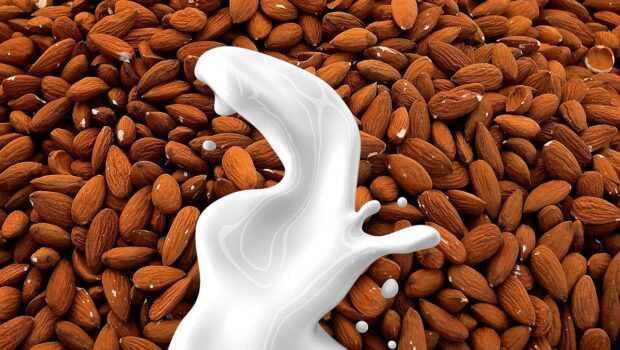How Almond Milk Can Help You Grow Stronger

Photo Credit: Ebizon.com
The growing concerns about the risks of consuming dairy products have seen many food-conscious people gradually shifting to plant-based alternatives like almond milk.
Almond milk is specifically a replacement for dairy milk, notorious for causing lactose intolerance. Milk is also chock full of essential nutrients, which can benefit the body in various ways. Besides, it stands out from many plant-based kinds of milk due to its delectable nutty flavor and rich texture.
Among the numerous health benefits of almond milk are its energizing and muscle-strengthening properties. In this article, we look at how almond milk might help you grow stronger.
1. Almond Milk Is Moderately High In Protein
Almond milk is notably low in protein compared to cow’s milk and other popular plant-derived milk, such as soy milk. The milk contains a paltry 1 gram of protein in an 8-ounce serving.
When you compare soy milk vs almond milk in terms of protein content, you’ll realize that soy milk provides more than twice as much protein as milk.
However, 1 gram of protein in an 8-ounce serving is still substantially high. That’s especially considering the many other valuable nutrients that almond milk contains.
Now, protein serves as the building blocks for the formation of muscles in the body. Increased protein intake directly translates to bulkier muscles, which ultimately ramps up your physical energy.
Protein is also involved in various physiological processes that lead to energy metabolism. So, a regular diet of milk might play a key role in helping you grow stronger.
2. Almond Milk Is Relatively Low in Calories
Calories are the forms of energy released when the body breaks down food.
High-calorie foods provide more energy to the body. But when you consume more calories than you need, your body stores excess calories as fat.
On a long enough timeline, calorie-dense foods can predispose you to unhealthy weight gain and other lifestyle diseases like obesity and diabetes. That’s why nutritional experts recommend consuming foods considerably low in calories, such as almond milk.
Almond milk contains only 39 calories for every 240 milliliters (ml) serving. The milk has between 50% and 80% fewer calories than dairy milk.
Due to its fewer calories, almond milk can boost energy levels without exposing you to unintentional weight gain. It’s also a low glycemic index food, implying it’s less likely to trigger blood sugar spikes.
3. Almond Milk Is Rich in Magnesium
This is another primary reason to incorporate almond milk into your diet. As a rich source of magnesium, almond milk plays a key role in aiding muscle growth and development.
Magnesium supports muscle growth by loosening tight muscles, thereby improving flexibility. This can be especially beneficial for people with reduced mobility due to muscle stiffness, such as arthritis and multiple sclerosis (MS) patients.
Magnesium also regulates blood sugar levels. Therefore, ramping up your intake of this essential mineral might help avert high blood sugar-related diseases like diabetes.
The high magnesium content in almond milk may also control blood pressure. Remember that hypertension (high blood pressure) and hypotension (low blood pressure) can adversely impact your energy levels.
4. Almond Milk Is High In Bone-building Calcium
Growing stronger may be synonymous with an increase in muscle mass. But unknown to many, bones also have an instrumental role to play.
Bones provide the muscles with proper anchorage. A higher bone density translates to bulkier muscles, consequently improving physical strength.
Fortunately, almond milk is also high in calcium – a mineral that supports the healthy development of teeth and bones. Calcium deficiency is to blame for most loose-hanging teeth and brittle bones.
Note that natural almond milk contains moderate amounts of calcium. However, most commercial milk brands are usually fortified with this helpful mineral.

Photo by kinkate:- https://pixabay.com/photos/jogging-run-sport-jog-sporty-race-2343558/
5. Unsweetened Almond Milk Is Low in Sugar
We’ve already hinted at how regulating sugar consumption may help avert various chronic diseases. But perhaps you’re wondering as to the relationship between low sugar consumption and growing stronger.
According to research, eating sugary foods may raise your blood sugar levels fast, giving you a quick energy burst known as a “sugar high.” But these feelings are only short-lived.
Once your cells absorb the sugar and the sugar levels in your bloodstream drop, you may experience a phenomenon called a “sugar crash.” A sugar crash is marked by inexplicable feelings of nervousness and fatigue.
Unsweetened almond milk is deficient in sugar, providing just 2 grams for every 240-ml serving. The moderate sugar content in almonds may help boost your energy levels without triggering severe adverse effects.
6. Almond Milk Is Loaded With Antioxidants
Almond milk abounds in antioxidants. But the most notable one is vitamin E.
Like most antioxidants, vitamin E guards against disease by reducing the oxidative damage caused to cells by free radicals. It turns out that consuming this fat-soluble vitamin may also help you grow stronger.
Vitamin E can increase your energy levels by boosting red blood cell production.
More red blood cells translate to more oxygen transportation to various body parts. Without oxygen, the body cannot generate energy for different physiological and metabolic functions.

Photo by 1195798:- https://pixabay.com/photos/milk-almond-milk-fresh-food-bio-2594538/
Final Word
Evidently, there are numerous ways almond milk may supercharge your energy levels and help you grow stronger. Remember to exercise caution while shopping for commercial almond products and avoid those laced with potentially toxic chemicals.
Header photo credit:- https://pixabay.com/photos/almond-milk-milk-nut-milk-non-dairy-1623610/





















Very Informative Article And also Very Easy to understand. i hope you will keep posting this type of article. THANK…